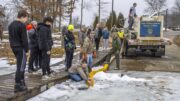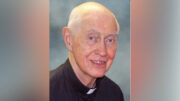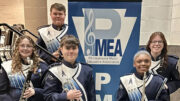PITTSBURGH (AP) — When he was 3 years old, Tristan Wainwright stopped speaking to his parents. His father, Jeff Wainwright, 44, said Tristan would only repeat movie lines and had severe communication issues.
Tristan, who now is 14 and lives in Louisiana, was eventually diagnosed with autism.
“I knew that he was trying to communicate with me this way, almost like the movies became his teacher,” Wainwright said. “When I asked him a question, he would repeat a movie line back in a way that made sense. He’s always been enamored with movies, and it’s how he learned.”
Tristan’s fascination with movies pushed him to research workshops, schools and anything that involved movies and filmmaking.
Through his interest, he heard about the Joey Travolta Film Camp, which introduces the art of film to people with autism. Three years ago, he came to his first film camp in Pittsburgh, which is held for two weeks at Winchester Thurston High School in Shadyside. The Arts for Autism Foundation of Pittsburgh hosts the film camp for children and young adults who get an opportunity to learn about filmmaking.
The camp is led by actor and director Joey Travolta, who is the brother of actor John Travolta. Joey Travolta, who began working as a special education teacher, said his experiences with autism and film production intertwined in 2003, when he mentored a student with autism who wanted to enter a film festival.
“The film was from a kid with autism’s point of view . what it’s like to have autism. We made this 10-minute documentary called ‘Normal People Scare Me,’ ” he said.
“I started getting calls from all over the country, people asking me to come and teach their kids. I started doing these camps about 11 years ago and it snowballed from there.”
He and other volunteers teach people like Tristan, from ages 8 to 28, how to write screenplays, operate a camera and collaborate on a film. The camps have three age groups, and each group eventually produces a short film based off a set theme. Similar workshops are held in New Jersey, Florida and California.
Wainwright said the experience for Tristan has been so positive that he has thought about moving his family to Pittsburgh because no strong programs for people with autism exist near their home.
Travolta has seen many families like the Wainwrights travel long distances to his camp. He said the reason campers usually return year after year is because both children and parents feel part of a close family and are able to empathize with each other.
“What we do in the adult program are also soft skills, life skills, social skills that you learn from film. Whether they’re going to be filmmakers or not, you’re thrown into it here,” Travolta said.
“With the workshops, I train people and eventually get employment for older campers. That’s my full-time job now, finding production jobs and finding internships.”
He was primarily directing and producing films in Los Angeles before beginning filmmaking workshops.
Carolyn Hare, director of the Arts for Autism Foundation of Pittsburgh, said the film camp relies heavily on community support. The filmmaking program started in 2011 with 12 campers and has grown each year. In the past two years, it has attracted more than 50 campers, with an additional 10 campers this year under the new Fourth Classroom program.
Hare said the tuition for the film camp is $1,800, but the foundation has about $20,000, mostly from private donations and some grant funding, that it uses to provide scholarships to offset some of the costs.
She said the foundation’s next step is to open a career training program for individuals with autism interested in getting into the film industry.
“It’ll be a year-round program, likely 16-week trimesters,” she said. “We’re gearing this toward young autistic adults, folks who have graduated from high school. But, you know, I don’t see why we couldn’t get high school students to get involved.”

































